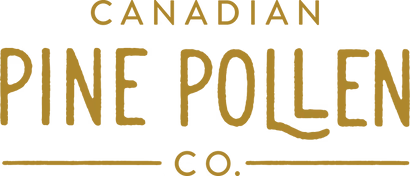Your Cart is Empty
FREE SHIPPING $149+ USA & CANADA | EU check out Clive de Carle
FREE SHIPPING $149+ USA & CANADA | EU check out Clive de Carle

5 Health Benefits of Drinking Chaga Mushroom Tea Latte + Recipe
April 18, 2019 4 min read
Mushrooms and fungi are a miraculous thing and only recently did we begin to venture into the fascinating topic with the new trend of non-psychedelic, medicinal varieties. Because mushrooms range in complexity and spectrum, I will solely touch on the chaga variety.
Canadian Pine Pollen’s new product venture, chaga mushroom chunks, are wild harvested from the deep, unpolluted forests of Northern Ontario, Canada — where the mushrooms abundantly grow on birch trees. British Columbia also offers an ideal climate for chaga growth, but the climate isn’t cold enough for a lengthy period of time, thus making it less sustainable than Northern Ontario. These mushrooms are a deep black on the exterior, but golden brown when split open. Some companies offer chaga mushrooms in powder form — and sadly, some add fillers to cheapen their cost — but Canadian Pine Pollen’s chaga chunks are purposely left as close to their natural state as possible to ensure maximum quality; “Our natural processes of drying and extraction ensures that the chaga we provide is as nature intended: wild, raw and living.” That’s an ethical practice I can stand behind!
Nutritional profile of chaga mushrooms.From a nutritional standpoint, wild chaga mushrooms are Mother Nature’s superfood, having more nutritional potency than the farmed alternatives. This is largely due to the fact that wild plants and herbs concentrate and retain nutrients for times of scarcity.
-
Immunomodulating properties —Sounds complicated but an immunomodulator essentially means “a substance that stimulates or suppresses the immune system and may help the body fight cancer, infection, or other diseases.”. Chaga mushrooms contain beta-glucans, which are polysaccharides known to support immune health.
-
Cancer-fighting —There has been a lot of emerging evidence that certain compounds found in chaga mushrooms have the ability to fight and prevent cancer. As mentioned above, chaga mushrooms are immunomodulating; they have been proven to increase cell turnover and health — but what is fascinating is that they’re known to target cancer cells. They can cell-differentiate. There’s still a lot of research to be done, but if you’re seeking an alternative to the typically aggressive conventional cancer treatments or want to have something that works alongside these treatments, these mushrooms might be an ideal and more gentle alternative/addition. Note: It’s imperative to never self-medicate with cancer. Do diligent research and always, always, always, work alongside a professional that specializes in this kind of medicinal treatment.
-
Potent antioxidants —Smoking, drinking, chronic stress, and processed food: these can all contribute to cellular damage from oxidative stress. Antioxidants, such as the zinc and b-vitamins found in chaga, help fight free radical damage from oxidative stress.
-
Gastrointestinal health —Chaga’s immune-boosting and antibacterial properties have been known to aid in gut health. After all, 75% of immune cells reside in the digestive tract, so gut health goes hand in hand with a strong immune system. Secondly, chaga’s antibacterial properties aid in prevention of ulcers and acts as a soothing treatment for the symptomatic discomfort. Many European cultures have used chaga mushrooms for centuries, purely for the gut health benefits — and for good reason!
-
Aid with Psoriasis —Psoriasis is a chronic autoimmune disease characterized by patches of abnormal skin that may look and feel red, dry, itchy, and scaly. Many holistic experts look at the internal environment of a Psoriasis patient — namely at the gut. Because chaga mushrooms help with immune support and gastrointestinal health, they may be an effective addition to a Psoriasis plan — but patients need to be patient as “the maximum efficiency of chaga Psoriasis treatment is noted after 9-12 weeks of continuous intake”. Note: some medicinal mushrooms can aggravate certain autoimmune diseases, so it’s vital to consult a professional before adding them into your regime.
***Do not take chaga mushrooms if pregnant or breastfeeding***

Coconut Chaga Tea Latte
Makes 4 servings
Ingredients:
-
8 x Canadian Pine Pollen chaga mushroom chunks
-
4 cups water
-
2 tbsp maple syrup
-
pinch of powdered cinnamon, nutmeg, and ginger
-
200ml canned coconut milk
Directions:
-
Place chaga chunks in a slow cooker with filtered water and brew for 8-12 hours (with lid on!) until water turns dark reddish-brown. This will make a rich concentrated tea which you can add to water or use like an espresso shot to make a stronger latte. Make sure to re-brew Chaga chunks (do not throw away!) they can be re-used until the water is no longer dark! Store the Chaga chunks in the freezer between batches or just keep your slow cooker brewing on the counter if you are a drink Chaga daily. When you are done making tea with the Chaga add a mushroom chunk to your blender when you make your next smoothie! Store any leftover Chaga tea in a mason jar in the fridge for up to three days. Or better yet, freeze the Chaga tea in ice cube trays for your next iced drink; that way the ice won’t dilute the taste!
-
In a high-powered blender, add brewed Chaga tea concentrate and remaining ingredients and blend on high until well combined and frothy. (I use a Vitamix Pro 750 series and blend for approx 1 minute on the The Hot Soup setting).Taste and adjust sweetness level to your liking.
-
Pour into a mug and melt away.
Make sure to share your creations on Instagram with the hashtag #holisticheels and #canadianpinepollen
Peace, self-love, and kale,
Monica Elena
Founder of Holistic Heels
Leave a comment
Comments will be approved before showing up.
Subscribe
Sign up to get the latest on sales, new releases and more …
